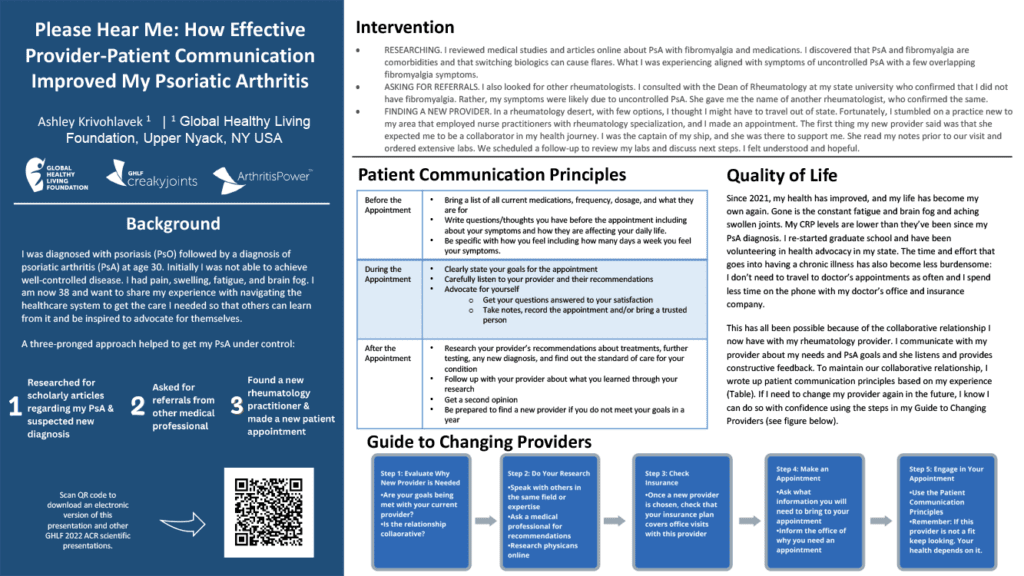Ashley Krivohlavek, 30, who lives with psoriasis and psoriatic arthritis, is no stranger to medical mishaps. From being misdiagnosed with fibromyalgia to searching for a new provider in a rheumatology desert with few options, Ashley has weathered several challenges along her health journey. “Initially, I was not able to achieve well-controlled disease. I had pain, swelling, fatigue, and brain fog,” says Ashley.
Today, she has found meaning in her health journey and is sharing her patient poster, “Please Hear Me: How Effective Provider-Patient Communication Improved My Psoriatic Arthritis,” at ACR Convergence 2022, the annual meeting of the American College of Rheumatology, to help others steer clear of these same challenges.
The Journey to Find the Right Provider
Ashley was frustrated with her current rheumatologist, who dismissed her concerns that her medication was no longer working. Determined to find a new provider, she began doing independent research and actively asking for referrals.
Finally, she found a nurse practitioner who specialized in rheumatology to support her. “The first thing my new provider said was that she expected me to be a collaborator in my health journey. I was the captain of my ship, and she was there to support me.”
Fast forward to 2021, Ashley’s health has improved tremendously and she’s been able to reclaim her life. “Gone is the constant fatigue and brain fog and aching in my swollen joints.” In fact, these days Ashley has re-started graduate school and has been volunteering in local health advocacy.
She largely owes her healing to the two-way relationship she shares with her provider. In hopes of encouraging others to cultivate a similarly supportive dynamic with their health team, Ashley’s poster lists “Patient Communication Principles” that can guide patients, before, during, and after an appointment. For example, patients are advised to “bring a list of all current medications, frequency, dosage, and what they are for” before the appointment, “clearly state goals” during the appointment, and “research provider’s recommendations” after the appointment. Ashley also created a five-step guide to help patients change providers.
What Ashley Learned — And What You Can Learn Too
Here, we talk with Ashley about her experience submitting a patient poster for ACR and what she hopes others will take way from her findings:
CJ: What was your motivation for submitting a patient perspectives poster?
Ashley: “My motivation stemmed from my goal to help others through their health journey. I had such a difficult time with getting a correct diagnosis, navigating treatment options, and finding the right medical team that I never wanted anyone else to go through what I have. Everything I do through patient advocacy is to create a network so that others don’t feel so alone.”
CJ: What are you most looking forward to at ACR22?
Ashley: “Everything — from communicating with other presenters to the people viewing them, I am excited for every aspect of the process. I will be attending virtually this year but I plan on going in person in the future. This is just such a wonderful opportunity for other patient advocates to reach out to each other and to help our community as a whole.”
CJ: What do you hope people will learn from your session?
Ashley: “I hope that my session will empower others to communicate with their physician without feeling overwhelmed or timid. I want people to come out of their appointments with a sense of strength and clarity for their future.”
CJ: Why is it important for patients like you to share your own research at ACR?
Ashley: “The importance of having patients present at a scientific conference like ACR is that it gets providers and patients together outside of the exam room to collaborate and be heard. That experience of seeing a patient or a doctor outside of the health care setting can humanize and give empathy to one another. It is also wonderful learning from each other.”
CJ: What did you learn about yourself and your health journey by working on your poster?
Ashley: “When I started writing my ACR poster, I was stretched thin. I was finishing a very difficult and busy semester of college. I also have many doctor’s appointments for my own chronic illnesses and my mother was recovering from a total knee replacement and my father was having corrective cataract surgeries. It was, to say the least, a very long, arduous time in my life. I saw my own strength. My power to endure.”
The Provider-Patient Tango
Ashley’s message is one full of empowerment, encouraging patients to be more involved and proactive in their treatment. Through her poster, she demonstrates how the partnership between doctor and patient is far from a one-man dance; it is a tango involving two parties. As Ashley says, “I communicate with my provider about my needs and PsA goals and she listens and provides constructive feedback.”
Want to Get More Involved with Patient Advocacy?
The 50-State Network is the grassroots advocacy arm of CreakyJoints and the Global Healthy Living Foundation, comprised of patients with chronic illness who are trained as health care activists to proactively connect with local, state, and federal health policy stakeholders to share their perspective and influence change. If you want to effect change and make health care more affordable and accessible to patients with chronic illness, learn more here.
Be Part of Research with ArthritisPower
Join CreakyJoints’ patient-centered research registry and participate in voluntary studies about managing arthritis. Learn more and sign up here.
Krivohlavek A. Please Hear Me: How Effective Provider-Patient Communication Improved My Psoriatic Arthritis. Arthritis & Rheumatology. November 2022. https://acrabstracts.org/abstract/please-hear-me-how-effective-provider-patient-communication-improved-my-psoriatic-arthritis.






